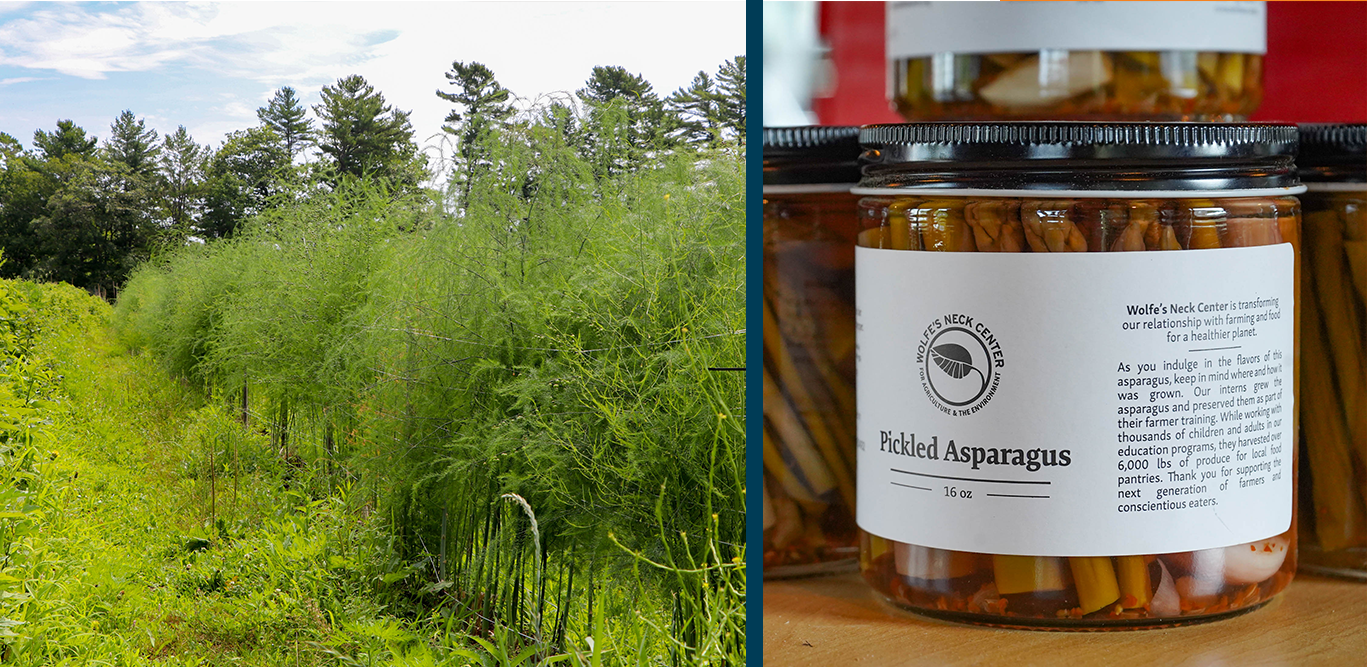Walk by our West Bay fruit and vegetable plot and you’ll see a tall blossoming crop, trellised and nearly six-feet tall and extending down a whole row. This is our asparagus patch, and despite it being quite a sight already, there’s a greater story and purpose to the crop than meets the eye.
Our organic farmers—as are many—are innovators. The field work is labor intensive without the use of chemical pesticides, the growing season is short in this region, and overworking the same land can be detrimental on the soil and surrounding environment. In order to diversify production and address a long-term soil health initiative at Wolfe’s Neck Center, our farm team amplified perennial production beginning in 2016. New crops planted in this first year were high bush blueberries, peaches, native beach plums, American plums, apple trees, raspberries, grapes, and asparagus.
The asparagus crop was a particularly interesting endeavor for our farm team. They’d observed a strong local demand, so they were excited to begin growing it on-site. The preparation time, however, has required some patience on their part. In spring of 2018, they ordered the Jersey Knight variety from Johnny’s Seeds, which arrived as bare root stalks. They planted that first season in an early spring downpour, and intentionally restrained from harvesting to establish the crop.
We are now in our second season of having asparagus. Our farmers relish in the sight of the early spring crop first poking through the ground, as it is a sign to them that the growing season is underway. Just as in the previous year, it is important to let the crop establish, and therefore they only did a light harvest and kept the remaining stalks in the ground. This harvest was in a narrow window of time, from 2-3 weeks in early- to mid-May, which limited a consumer outlet. Our Farm Store was not yet open, and it was premature for our CSA shares. It was important for our farmers that even with a light harvest, we preserve it and educate both our farm interns and visitors about perennial production and food preservation.
These are only some of the benefits that come from perennials. As climate change becomes a more pressing problem facing our society, using regenerative farm practices can shift agriculture from being a cause of global warming to being a solution. Since these crops return year after year, they keep the soil stable, retaining water, pulling carbon from the atmosphere, and improving drainage. They increase plant and insect biodiversity and attract pollinators for a longer duration than our annual crops. They also act as a windbreak to protect our other crops from the coastal gusts.
All of this is an important education tool for our farm interns, training to have their own farms one day, as we emphasize the use of regenerative ag practices for soil health. After this season’s asparagus harvest, they used some seaweed from our shores to spread at the base of the stalks for weed suppression and to add nutrients into the soil. They also learned how significant value-added can be as a tool for extending the season and preventing food waste and maximizing the use of excess. Processing fruits and vegetables for value-added is a dynamic part of our farmer training program and sends the interns out with unique job skills in the field.

From the early season harvest and quick turnover to processing, our farmers created 40 jars of pickled asparagus to sell in the Farm Store. Despite testing their patience of letting the crop become more fully established, the farm interns have been fulfilled to see the excitement of asparagus-lovers picking up a jar to get a taste of it out of season. Try to snag a jar before they sell out, and know that you are supporting farmer training, farming for healthier soils, and so much more.
← Back to Blog